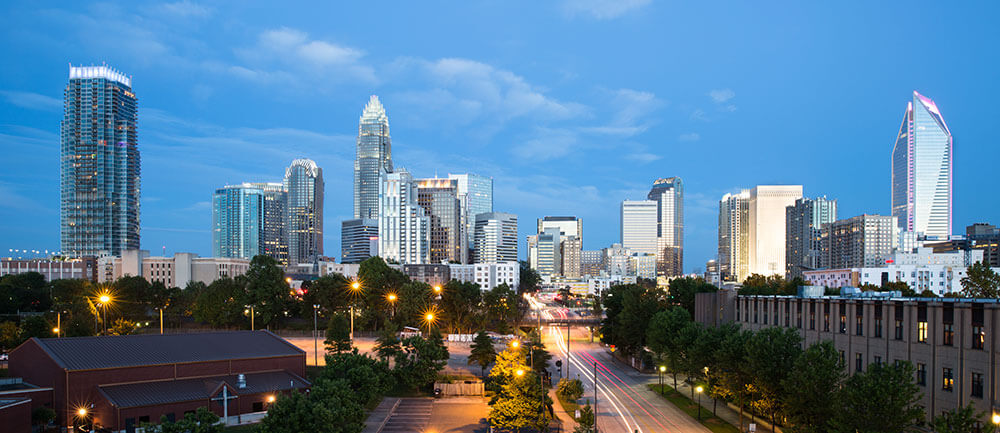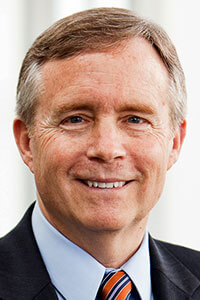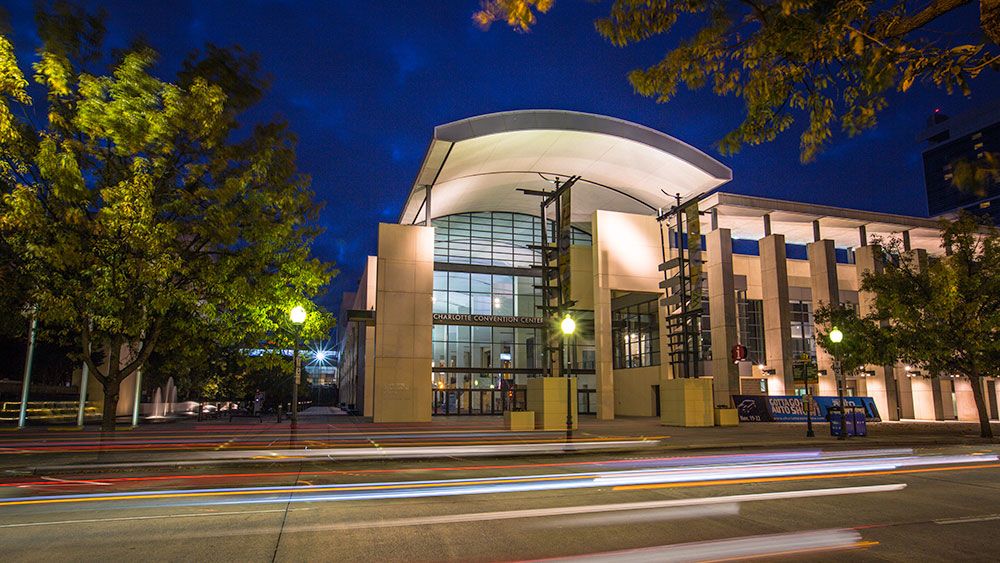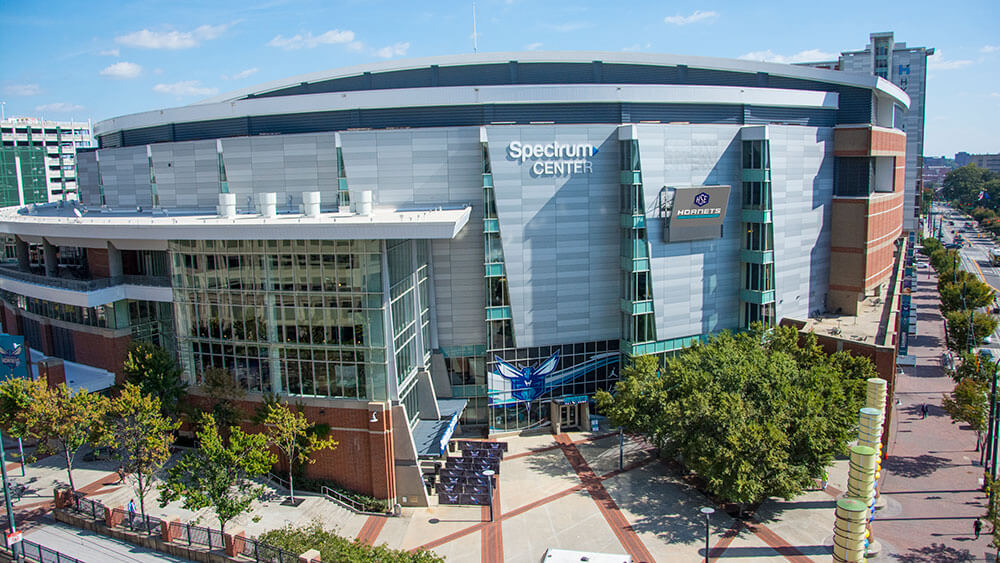
The city of Charlotte Charlotte, North Carolina, is focused on how to pull off a successful, and safe, Republican National Convention in August. (Courtesy Visit Charlotte)
The timing for the resumption of live events in 2020 might be the biggest question on meeting planners’ minds, but Mike Butts has his sights set on August. Butts, vice president of sales and executive director at Visit Charlotte, is in the midst of preparing the destination to host the Republican National Convention (RNC), Aug. 24–27.
“This is one of the highlights of my life to be able to host such an event,” he told Convene in late April. “We’ve booked a lot of business over the years, but there is an unbelievable amount of pride and a sense of responsibility with an event of this magnitude. It’s the Super Bowl of conventions.”

Mike Butts
Charlotte hosted the other Super Bowl — the Democratic National Convention — in 2012. The field for the upcoming convention will look quite a bit different, though. COVID-19 has paused all face-to-face gatherings throughout the spring, and Charlotte, which was under North Carolina’s stay-at-home order when Convene talked with Butts, is focused on how to press play and operate when delegates begin arriving for the convention in August.
Butts said that health and safety is the “hottest topic” among everyone at Visit Charlotte right now. “How do you open for business in a way that is safe,” Butts asked, “and makes people feel comfortable that they can come to the city and spend time in our venues?”
To find an answer, the organization recently had an infectious diseases expert walk through its buildings, and also launched a task force to address what must change in a world where the coronavirus has not yet been eradicated. Many initial ideas for change were what Butts described as “low-hanging, common-sense fruit” such as replacing buffet lines, eliminating serve-yourself charcuterie tables for food-and-beverage service, and developing alternative plans for seating requirements in consultation with the fire marshal.
“Then, you have to get deeper to understand how this virus spreads,” Butts said, “and we are listening to the experts from the CDC and the local health department to understand the right cleaning solutions and the high-touch areas that we might not immediately think about as points of transmission. You know the elevator button and the doorknob are places where germs can easily spread, but are there other touch points that you don’t pay attention to?”
While sanitization and cleaning efforts are top priority in advance of the RNC, Butts believes that the task force is not a short-term solution. “I am absolutely convinced that this task force will become an ongoing committee within our company,” he said. “This will be an ongoing way of life.”

Sanitization and cleaning efforts at the Charlotte Convention Center are top priority in advance of the Republican National Convention, but officials are concerned about what happens when delegates leave the venue as well.
Managing Human Nature
Butts is focused on the immediate needs of what happens inside the Charlotte Convention Center and the Spectrum Center — the two main venues for the RNC — and he said that Visit Charlotte will lean on major hoteliers and restaurant groups to offer guidance to their locations to make sure that each of their properties is a clean environment. However, he acknowledged there are gray areas that will require extra attention.
“Once these people leave the convention center and head over to The Westin or The Hilton, how do we make sure that we don’t do that in a way that puts them all at the street corner bunched up in a line?” Butts asked. “That will be something that we will have to tackle sooner than later, but right now, we have to tackle what happens in the building.”
And while officials can manage the flow of crowds and the cleaning of surfaces, Butts pointed out that human nature is more difficult to control. “The biggest challenge is people interacting with each other,” he said. “Some people are very good at staying socially distant, but some people are oblivious. In a crowded environment, this is the hardest part.”

Visit Charlotte launched a task force to address what measures venues hosting the RNC, including the Spectrum Center, will need to take to keep delegates safe.
‘Full Steam Ahead’
While there is uncertainty around how different parts of the U.S. will operate around COVID-19 this summer, the organizers of the RNC are resolute that the convention will happen face-to-face. “We are full steam ahead planning a traditional convention,” GOP Chairwoman Ronna McDaniel said in a press briefing in mid-April. “We do not think at this time we have to switch to an alternative plan, but of course, we will monitor circumstances and adjust accordingly.”
McDaniel added that the convention will not be built out until July, which gives the organizing committee additional time to determine any potential adjustments. “But we will have to have an in-person convention,” she said. “Those are the bylaws of the RNC and so currently, going forward, we’re planning on a full-scale convention.”
For Butts and Charlotte, McDaniel’s show-must-go-on mentality is great news. The convention is worth approximately $100 million of economic impact for the city, and the CVB took an instrumental role in working to secure the business.
“One in nine people in Charlotte depend on us to create business for them,” Butts said, reflecting on what he told the head of the convention’s site-selection committee during the RFP process. “We have housekeepers and servers who wake up in the morning and need to make sure they can pay rent. Some of them live check to check. We need to make sure they have checks.”
With that in mind, the RNC crowd will be even more meaningful to the Charlotte hospitality community. For now, they expect similar attendance based on historical figures — 50,000 people came to the RNC in Cleveland in 2016 — but have also committed to following any necessary social distancing measures that are in place. And no matter how far apart anyone may be standing from each other, the images of Charlotte in the media will be key to the city’s recovery efforts. “We had no idea how valuable and how important this event was going to be,” Butts said. “To be on the global stage in these circumstances, I don’t know if I can put a value on that.”
The heightened importance has elevated the level of collaboration between the destination and the organizers, too. Butts said that the Visit Charlotte team is in daily communication with the RNC committee. “We are fully partners,” he said. “We’re all in an environment that none of us have ever seen. We’re shoulder to shoulder, locked arms. There are no petty issues. It’s not about thinking about another dollar on a menu. You drop the small stuff, and you focus on what you need to accomplish.”
David McMillin is an associate editor at Convene.
